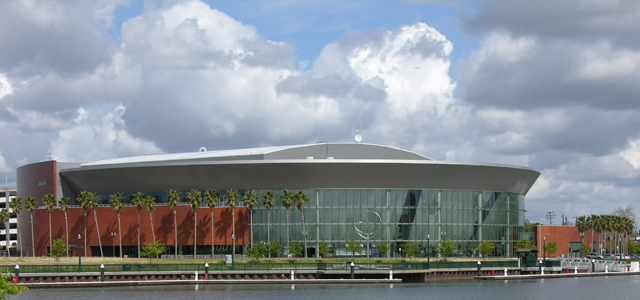
The Stockton Arena in Stockton, California is home to the Stockton Thunder ECHL professional hockey team, owned by Canadian businessman Brad Rowbotham. The stadium, which opened in 2005, cost $69 million to build, with the now bankrupt city footing the entire bill. (City of Stockton)
Stockton, Calif., is bankrupt and, until Detroit declared itself so, was the largest U.S. city to have fallen on such tragic financial hardship.

Lori Gilbert
You never hear anyone in town say, “We wouldn’t be bankrupt if they hadn’t built that arena.”
Instead the arena is a source of pride in a city desperate for positive attributes. Forbes Magazine consistently lists Stockton as the most miserable city in the nation. For those who love Stockton, the arena is a great addition to the city; “I never thought Stockton could have something this nice,” is a common refrain.
The arena is a gleaming thing of beauty, bathed in evening purple lights. It was built with city money as part of an effort to revitalize the downtown waterfront. Stockton sits at the end of 1,100 miles of waterway known as the Delta, which meanders through the valley until it reaches the eastern end of the San Francisco Bay. Over the years, Stockton had leaders who understood the value of that waterway as a point of development, but it wasn’t until the City Council approved funding for the sports facilities in 2004 that it finally took action.
By 2005, at a combined cost of $134.5 million, the city had a new ballpark and arena. The new ballpark provided a state-of-the-art facility that helped land a partnership with the Class A team of the Oakland Athletics, the major league franchise that plays 60 miles away. It was a significant step up from our 50-year-old stadium that had attracted minor league baseball teams from far-flung affiliates – like the Cincinnati Reds or the Texas Rangers.
The arena has brought minor league hockey, arena football and indoor soccer to Stockton. The first event in the arena was the home opener of the Stockton Thunder, the ECHL professional hockey team. The game sold out and folks from all over the region, not just Stockton, showed up. The arena was recently also home to Stockton Con, a pop culture convention modeled after Comic Con. The one-day event attracted 7,800 visitors.
The 2008 financial collapse halted any hoped-for private-sector development around the arena and ballpark and their expected tax revenue never materialized. Stockton Arena though, remains a valued, special part of the community that is worth more than the expense of erecting it.
Lori Gilbert is a features writer for The Record in Stockton, California. Prior to joining the features staff in 2008, she spent 23 years as a sports writer, the final ten as the paper’s sports columnist. She held that position in 2005 when the new sports facilities were built.









